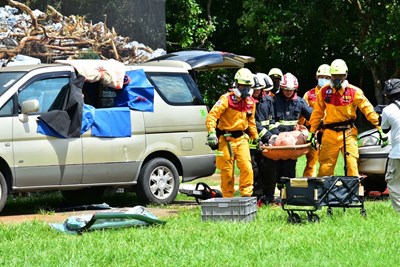
The Water Resources Bureau thanked the partners involved in the drill, including the Nantou County Government, the National Airborne Service Corps of the Ministry of the Interior, and the Ministry of Agriculture of the Executive Yuan, and the officials from the Disaster Prevention and Relief Office of the Executive Yuan for their support and guidance. The drill helped to consolidate disaster relief resources and improve lateral and vertical communication across public and private sectors, thereby enhancing Taichung's disaster resilience. This preparation aims to minimize damage and harm in future disasters, safeguarding the safety of citizens' lives and property.
Director Fan Shih-I of the Water Resources Bureau said that Taiwan's location and changing weather patterns make it vulnerable to disasters caused by intense rainfall from plum rains, fronts, or typhoons. The drill simulated scenarios where days of continuous rainfall from a lingering plum rain front led to large-scale landslides, significant mudflows, and the formation of a landslide lake in Laiyuan Village, Wufeng District, Taichung City, as well as a road collapse in Lishan Village, Heping District, which severely disrupted transportation and isolated the area. Based on these scenarios, the drill focused on pre-disaster preparations, traffic control in affected areas, evacuation during red and yellow alerts, shelter and resettlement, search and rescue, and post-disaster recovery. The drill also utilized technology, including radar life detector, to detect and locate survivors by monitoring their breathing, heartbeat, or other vital signs for rescue operations.
Moreover, the Dolphin helicopter carried out missions such as observation, reconnaissance, and aerial delivery of supplies; a mobile landslide observation vehicle was utilized to gather real-time data on landslides and large-scale collapses; and drones provided on-site footage just in a short period of time, allowing for up-to-date information on the ground situation. Through flexible use of technology, substantial and complex monitoring data regarding disasters can be handled, enabling disaster prevention actions based on the gathered information. This technology-driven approach aims to achieve the goal of issuing timely alerts and safeguarding people at all times, thereby reducing the risk of accidents and disaster-related losses.
The Water Resources Bureau added that Taichung City currently has 110 streams prone to landslides, with seven large-scale collapse-prone areas located in Heping District. The increasing threat of landslides and collapses, driven by extreme weather, highlights the importance of disaster prevention drills. The city government adheres to the principle of staying vigilant and being prepared and views these drills as essential for evaluating disaster response measures, detecting problems, and making improvements. In addition to being well-prepared with supplies and response strategies, the city government plans to continue enhancing the use of technology in disaster prevention, aiming to strengthen Taichung's disaster resilience and make the city safer and more robust.
The Water Resources Bureau expressed gratitude to the Buddhist Tzu Chi Charity Foundation, service centers of the Mustard Seed Mission in Central Taiwan, World Vision, the Chinese Christian Relief Association, self-organized disaster prevention communities in Fenggu, Laiyuan, and Lishan Villages, the Jinrong Community Development Association, Asia University Hospital, Jen-Ai Hospital - Dali Branch, the Wufeng Branch, Third Corps of the Fire Bureau, Taichung City Government, and the Taichung City Mountain, Sea, and Tun Rescue Association for their support and involvement in the disaster prevention drill. To honor their efforts, certificates of appreciation were presented today.
(7/1*14)* Water Resources Bureau
Contact person: Miss Chen, Water Resources Bureau, Taichung City Government
Contact number: 04-22289111 ext. 53710

 Facebook
Facebook
 Twitter
Twitter
 LINE
LINE